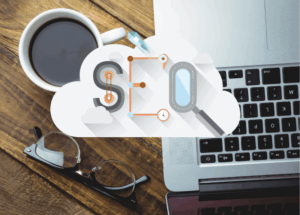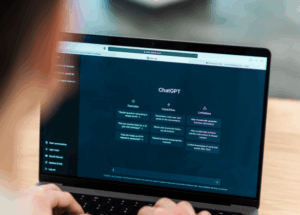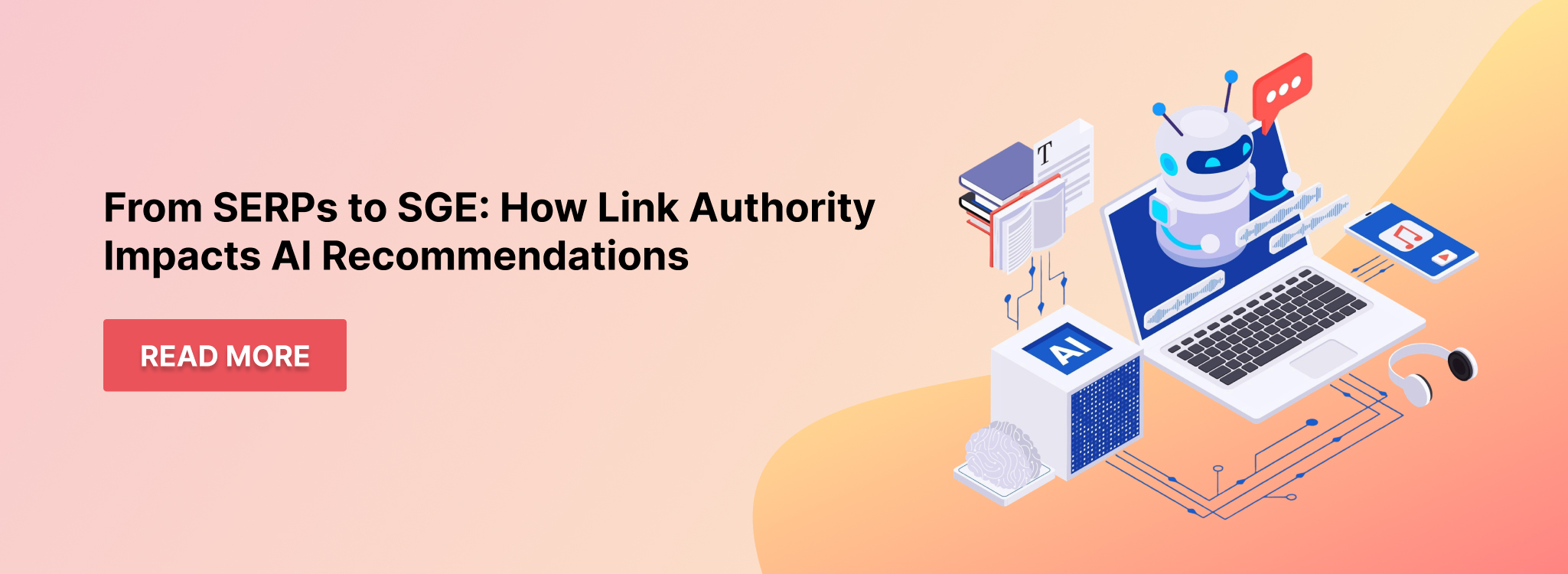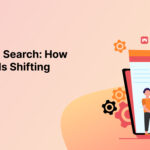From SERPs to SGE: How Link Authority Impacts AI Recommendations
Recently updated: July 15th, 2025
Do links still matter in AI search results? Yes, links and their authority are still crucial in rankings, as well as in SGE snippets, AI-generated summaries, and conversational answers.
In a recent industry-wide survey by Editorial.Link, 73.2% of SEOs said that links influence the likelihood of being visible in AI search results, including Google SGE, ChatGPT, and other generative AI tools.

Source: Editorial.Link
That means nearly 3 out of 4 SEO experts agree that even as AI is reshaping how search is happening, links still matter.
Key Takeaways
- Backlinks still matter. Even in Google’s AI-powered SGE results, link authority remains a core trust signal.
- Strong backlink profilesinfluence which content gets pulled into AI-generated answers.
- Visibility in AI snippets often comes from strong SERP positions, which are powered by backlinks.
- Editorial links beat directory links.Earn placements from real content on high-quality sites.
- Digital PR is now a powerhouse for link building.Brand mentions and placements in trusted publications improve your AI visibility.
- Avoid outdated tactics.Link farms, spammy guest posts, and manipulative practices can hurt AI trust and visibility.
- E-E-A-T is essential.Experience, expertise, authority, and trustworthiness, backed by high-quality links, are key to being chosen by AI.
What the Data Says: Are Links Still a Ranking Factor for AI?
Here’s what else the data revealed and what it means for you:
- 9%believe their competitors are actively buying links to stay ahead in AI search.
- 9%think even unlinked brand mentions contribute to organic rankings, which implies that brand visibility and links go hand in hand.
- 8%believe that nofollow links also help improve rankings.
- 9%said a site can rank without links
If you want AI to notice you, you need to earn trust, which starts with links. And the competition? They’re not waiting around.
The Real Cost of Link Building in the Age of AI
The link game isn’t cheap anymore as link budgets are continuously rising.
- $8,406 isthe average minimum monthly budget to compete in niches with high competition.
- $508.95is the going price for one high-quality backlink.
- 56%of SEO teams now outsource at least part of their link acquisition, while 44% handle link building in-house.
- In-house SEO teams spend 03% of their entire SEO budgeton link building alone.
These costs are expected to rise even further over the next two years, particularly in competitive sectors such as iGaming, technology, and finance.
Why? Because AI is very selective about what link it wants to use as a source or a recommendation.
If other trusted, credible sources don’t link to your page, it’s not likely to be selected by AI for a snippet, overview, or citation.
AI models don’t cite just any link; they summarize from sources that have:
- A rich backlink profile
- High link relevance
- Strong domain trust
- And clear topical authority
That’s why digital PR is gaining even more popularity right now. It’s not just for media buzz anymore. Digital PR is the frontline tactic for earning links that matter in both SERPs and AI search.
The Most Effective Link Building Tactics Right Now
Let’s take a look at what link-building tactics SEO professionals are using now.
- 6%of SEOs say digital PR is the most effective way to earn links in 2025.
- 6%say finding unique link opportunities is more potent than just copying competitors.
- 7%focus on acquiring backlinks to “money pages”, which include product, service, or high-conversion content.

But with opportunity comes risk.
Link spam, low-quality content, and paid link schemes are still around, and SEO pros are more cautious than ever:
- 89%avoid using spammy outbound links.
- 3%say low-quality content is a dealbreaker.
- Still, 1%are willing to pay for links if the source has genuine value.
Did you know?
55.2% of SEOs report that link building remains the most challenging aspect of their job.
Why? Because premium links are too expensive (as 75.1% say), scaling link efforts without compromising quality is a daily challenge.
What Is Google SGE?
Google SGE (Search Generative Experience) is an experimental feature of Google Search that answers your queries before you scroll, click, or compare.
The AI-powered summaries (called AI snippets) you see on the top in search results pull information from across the web, rewrite it, and serve it above the fold.
SGE is a search shift. Let’s see how it works:
- You enter a query.
- Google uses its generative AI toolsto scan top-ranking, high-authority content.
- It condenses, combines, and summarizeskey points into a conversational answer.
- That answer appears at the very top, often pushing traditional results further down the page.
In other words, SGE doesn’t just show the best answers. It tries to be the answer. That’s why being “ranked #1” in the old sense no longer guarantees visibility.
How Is Google SGE Different from Traditional SERPs?
SGE flips the SEO game. Here’s how Google SGE is different from traditional search engine result pages:
| Traditional SERPs | Google SGE |
|---|---|
| Lists 10 blue links | Summarizes answers using AI |
| Clicks drive discovery | AI decides what’s worth summarizing |
| Titles and metadata matter most | Trust signals and topical authority matter most |
| Ranking = visibility | Citation = visibility |
| The user chooses what to read | Google chooses what to include |
In the past, even ranking #3 or #8 could still generate traffic. Now, SGE cherry-picks content from just a handful of sources to craft its AI-generated overview. It pulls data, phrasing, and even conclusions without showing your title or brand unless it trusts you.
That means your focus must shift from trying to rank for everything to being chosen for something that matters. What determines if your content gets chosen? That’s where link authority enters.
How SERP Results Are Influenced by Link Authority
Google still crawls, indexes, and ranks based on traditional signals, and backlinks remain one of the strongest signals of authority.
So, when the AI engine builds a generative answer, it does this:
- Pulls from pages already trusted by Google’s algorithm.
- Prioritizes content with strong backlink profiles.
- Leans into topical depth and relevance, which are often built through natural editorial links.
- Avoids content that has been flagged as low-quality, spammy, or manipulative (such as link farms, paid link schemes, and thin content).
According to Writesonic, over 40.58% of AI citations are from Google’s top 10 SERP results.
The pages that rank in traditional SERPs are the same pages most often chosen for SGE summaries.
So, if you’re building high-quality links that:
- Come from credible sources
- Point to pages with rich, helpful content
- Are earned, not bought…
You’re improving your search rankings and training Google to trust your content enough to let its AI speak with your voice.
Why Link Authority Still Influences AI Recommendations

Google’s AI-generated content doesn’t randomly pull from the web. It’s pulling information from what it knows it can trust. How does it decide what links it can trust to pull information? The answer is link authority.
The backlinks you’ve been chasing since the early days of SEO are still the bedrock of trust signals in the age of AI.
AI models, especially those powering tools like Google SGE, have a simple but vital job: Don’t say something stupid.
That means every word they generate must come from sources that are:
Topically accurate
Backed by real-world trust signals
Cited or referenced enough to prove credibility
Nothing does all these three things better than a robust, clean, relevant backlink profile.
AI doesn’t know the truth, but it knows patterns. So, when it’s asked a question like “What’s the best protein for muscle growth?” or “How do I apply for a digital nomad visa in Spain?”, it does what Google has always done: it filters content based on ranking signals.
Thus, link authority remains one of the strongest signals.
That’s why strong backlinks matter more than ever. They do three critical things:
- Validate the source– If 300 respected sites are linking to your page, that’s a public vote of confidence. AI may not detect link authority, but it recognizes the pattern that builds confidence.
- Signal topical depth– Sites with rich backlink profiles often cover topics comprehensively. That’s what AI wants: full, nuanced, well-rounded answers.
- Enable summarization– If your page is already ranking high (where your backlinks may have played a strong part), AI is more likely to pull you into its snippets.
Strong backlinks → Better SERP positions → Higher likelihood of being selected in AI answers
How AI Systems (Like SGE) Interpret Link Authority
How exactly do AI engines like SGE assess your site’s link authority? They no longer use traditional PageRank directly. But they interpret link profiles as part of their AI ranking signals.
1. It Starts With “Query Fan-Out”
This is Google’s process of expanding a user query into a broader set of related intents.
Let’s say someone types: “Is magnesium good for sleep?”
The AI system fans this query out to:
- Health benefits of magnesium
- Magnesium supplements comparison
- Dosage and timing
- Clinical studies
- Magnesium deficiency and sleep disorders
Now, it needs source content for each of these branches.
So, what does SGE do? It pulls from:
- Top-ranking articles(which got there through high authority i.e., backlinks)
- Sites with historical topical depth(backed by a strong internal and external linking structure)
- Sources that have been linked to by other credible domains(this is where your digital PR pays off)
In short, AI performs a trust-weighted fan-out, then builds a “summary” using the most authoritative sources per subtopic.
That is how your link authority becomes your most valuable asset.
2. Source Attribution in AI Snippets
AI doesn’t always cite you, but it often summarizes your thoughts, takes your phrasing, even pulls your bullet points, and puts them in its AI snippet.
But here’s the good news:
- Nearly half of AI answers pull answers from top-ranking domains (Source: Writesonic)
- Those top-ranking domains consistently have the strongest link profiles
- So even if you’re not visibly credited, you’re still influencing the conversation
3. AI Content Selection Relies on Historical Link Data

Large Language Models like the ones Google uses are trained on the open web, and a huge part of that training includes learning:
- Which domains show up the most
- Which links point to them
- Which ones are most cited, most clicked, and most referenced
Even in zero-click searches powered by AI, the content surfaced still reflects a history of trustworthiness, which is built through links.
AI can now detect spam, flag manipulative content, and also ignore shallow articles.
But when it sees a page that’s earned its place through:
- Years of relevant inbound links
- Contextual mentions from expert sources
- Mentions in high-authority publications
…it pulls that page into its internal map of “credible source clusters.”
That’s the algorithm you’re optimizing for now to be seen by the machine as a definitive voice.
How to Build a Link Strategy for SGE Results
In the age of AI search, Google SGE, and AI-generated snippets, you need to do more than just get links. You need to earn the right links that signal your authority to machines, not just humans.
SEO for AI is no longer optional; it is essential for survival in the digital world. That means rethinking your link-building strategy fast.
Step 1: Prioritize Editorial Backlinks Over Directory Links
Go beyond directories, footer links, and Sidebar widgets as they are outdated. What works now are editorial links that are placed within real content on real websites by real writers.
These links pass PageRank and signal to AI systems that:
- Your brand has editorial value
- Other experts trust your insights
- You’re part of a topical ecosystem, not a random domain
So, start pitching to journalists. Collaborate on research. Create resources so good that others want to reference them.
Now, you are in the game of reputation building for AI.
Step 2: Build Authority in Niche Topics
Here’s something most SEO pros miss: AI doesn’t need you to be famous. It requires you to be relevant.
Forget being “everything for everyone.” In the AI age, you win by being the go-to source for something specific.
So, if you run a SaaS for legal workflows, dominate that niche.
- Publish guides that no one else is writing
- Create datasets or original research
- Get links from sites that talk about your space, not just high-DA generalist blogs.
This builds E-E-A-T (Experience, Expertise, Authoritativeness, and Trustworthiness), a critical trust signal that AI models use to evaluate content sources.
Step 3: Focus on Topical Depth and Link Relevance
A deeply researched page, with internal semantic linking, supporting articles, FAQs, and a few highly relevant links from expert sites, is what you need to focus on. It’s because AI prefers pulling answers from topical clusters, collections of content that show not just one good post, but a history of subject mastery.
This is where semantic linking comes in.
Build internal content that reinforces your authority around a theme.
Then, earn external backlinks to the core hubs in that structure.
Step 4: Leverage Digital PR for Authoritative Placements
Digital PR is now being used as AI training data. When you land a mention in Forbes, TechCrunch, or your industry’s top trade site, you’re sending a signal to every AI model crawling the web: “This brand matters.”
That signal echoes across:
- Knowledge graphs
- Citation databases
- Entity recognition layers
- SGE answer selection filters
Digital PR gives you the kind of brand mentions, contextual citations, and earned backlinks that AI systems look for.
Mistakes to Avoid with Links in the AI Era
Now that you know what to do in the SGE era, let’s talk about what not to do.
Mistake #1: Believing the Myth That “AI Ignores Backlinks”

Fact: AI uses backlinks more than ever, not to score you on a 0–10 scale like the old PageRank days, but to verify:
- Your site’s history
- Your connection to other trusted domains
- Your reputation within your niche
Backlinks are not dead. They’ve just become invisible credentials.
And if you don’t have them, you won’t just fall in rankings, you’ll vanish from AI recommendations entirely.
Mistake #2: Thinking “Nofollow Links Have No Value”
Fact: Google has already confirmed it treats nofollow as a “hint,” not a hard stop. In the context of AI search, any brand mention with a link, even nofollowed, can boost your entity recognition and visibility in knowledge graphs.
So, stop ignoring:
- Social media links
- Wikipedia citations
- High-quality forums and Q&A platforms
They may not juice your PageRank, but they help with SEO for AI.
Mistake #3: Using Outdated Tactics (Link Farms, Guest Post Mills)
Fact: AI is trained to spot patterns that look fake, low-value, or manipulative. So, if your backlink profile is full of:
- Guest posts on irrelevant blogs
- Paid links from sites with spammy outbound link patterns
- Directory listings with no contextual value…
You’re not just being ignored, but you’re being flagged.
That’s why link spam and low-quality guest posting are more dangerous than ever.
They hurt rankings and also damage source credibility, which removes you from the AI conversation before it even starts.
If you build links with purpose, you will not only show up in search but will also be the voice that AI trusts, quotes, and builds on.
Even if the user never clicks, you’ll still be the one powering the answer, which is the new definition of visibility.
Frequently Asked Questions on Link Authority and AI Recommendations
What is the importance of link building in AI-generated content?
AI systems, such as Google’s SGE, rely on authoritative and trustworthy sources to generate summaries. Backlinks act as digital trust signals that help AI determine which pages are reliable enough to include in answers. If a page has more high-quality backlinks, it has a higher chance of being viewed as a credible source and becoming more visible in AI-driven search results.
Can AI models detect domain authority?
Yes, AI models can detect and even predict domain authority by analyzing the patterns and quality of backlinks pointing to a site. While they may not use traditional SEO metrics like Domain Authority scores, AI systems evaluate authority based on factors such as link quality, editorial trust, topical relevance, and the frequency of a site’s references across the web.
How do I build links for AI visibility?
To build links for AI visibility, you should focus on earning editorial backlinks from reputable and topically relevant websites. AI models prioritize content that demonstrates expertise and trust, so aim for mentions in news articles, industry blogs, and digital PR campaigns. Avoid spammy link-building tactics and instead concentrate on creating high-value content that others naturally want to reference and link to.
What kind of links are prioritized during SGE results?
SGE results prioritize high-quality, editorial links that come from trusted and relevant sources. Links embedded in useful, well-written content on authoritative websites carry more weight than links in directories or sidebars. Google’s AI looks for backlinks that signal credibility and topical depth, often preferring sources with consistent, niche-specific authority.
Latest posts by Vijaya Tyagi (see all)
AI Mentions Are the New Backlinks – Why They Matter - December 10, 2025
Local AI SEO: Get Picked for “Near Me” - November 26, 2025





2 thoughts on “From SERPs to SGE: How Link Authority Impacts AI Recommendations”